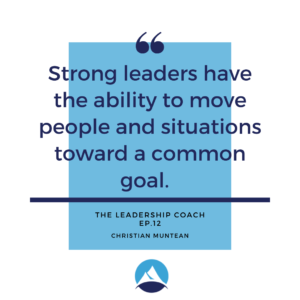Why You Need To Get Comfortable With Being Uncomfortable

 People are too interested in being comfortable. Comfort isn’t that good for you. It’s a horrible indicator of the “right” choice. It will almost never indicate the most reliable path for growth.
People are too interested in being comfortable. Comfort isn’t that good for you. It’s a horrible indicator of the “right” choice. It will almost never indicate the most reliable path for growth.
As a leader, if you have any vision or aspiration, comfort should make you suspicious.
Make yourself uncomfortable. On purpose.
Leaders who avoid discomfort no longer lead. At least not in any meaningful way. They won’t lead change, they avoid conflict, they no longer pursue growth.
The strongest leaders who have the greatest impact make themselves uncomfortable. As habit. They face their fears, their vulnerabilities, and their doubts.
Change is uncomfortable: Some changes happen to us. Some changes we initiate. There is always a reasonably high chance that change will be uncomfortable for someone. Perhaps directly for the leaders. Sometimes indirectly, by having to deal with the discomfort of others.
Pay attention to, but don’t be overly influenced by the uncomfortable sensations that may surround change.
Conflict is uncomfortable: Conflict is uncomfortable. Most leaders try to avoid it. Others try to win it quickly, as opposed to enduring the discomfort of listening to and engaging others.
But conflict is a fantastic opportunity for growth. If we allow it, it can generate personal growth. It can help us understand the needs and desires of others at a deeper level. It allows us to identify potential improvements in the systems we work within. It allows us to evaluate our cultures and consider if our basic assumptions and habits best serve us.
Growth is uncomfortable: There is no question. One of the great deceptions of growth is the thought, “If we were only at this special desired state – everything would be easier!” Perhaps that is true. But even so, the path to that desired state is usually challenging.
My greatest jumps in growth as a person or in my business were nearly all birthed out of uncomfortable experiences. I’ve observed the same for my clients. It is very rare for meaningful growth to not be accompanied by some sense of discomfort.
How to get comfortable being uncomfortable.
Identify what discomforts we avoid: It’s easy to be avoidant without even really noticing that we are doing that. It’s important to identify what those are so we can act intentionally – not reactively.
Face fears – most discomfort is in perception: Yes, there are actual things that can hurt you. But for the most part, our fears are about what we imagine. Not what is real. Or even necessarily likely. Most fears dissipate with a dose of reality.
Tackle small discomforts first: You can build up your tolerance levels for discomfort. The more discomfort you can tolerate, the more options you have. But you don’t have to start at the deep end of the pool. Just get in the pool and stop sitting at the edge. Start working your way towards the deep end.
Find a friend: It’s more fun with a friend. Find a partner or a team. Hire someone to guide you. Go with someone. Discomfort is nearly always better when shared. It can even become fun.
Also, just as comfort is a poor indicator of the right direction to take, discomfort is also a poor indicator of the path you should follow. A friend can help you get outside of your own head and interpret discomfort.
Take good care,
Christian
Would you like my help for yourself, your team or board to get a clear vision of 2020? Don’t leave it to chance. Give me a call 907-522-7200 or e-mail me.
FREE TOOL: The Value Builder System
Are you curious about the value of your company? The Value Builder System™ is a 13-minute online questionnaire that evaluates your business on the eight factors that contribute more to its attractiveness and value. These factors are scored on a scale of 1-100. Businesses that score over 80 are likely to command 70%-100% higher value than others. Click here to learn more or get your free Value Builder Score.
In my podcast, THE LEADERSHIP COACH, we explore effective, high impact and enjoyable leadership. We talk about personal development and the attributes that all effective leaders possess. I interview other leadership experts who share their knowledge and tips to help you build the confidence to lead and learn the habits of good decision-making.
Episode #12 is available now: You Can Only Lead To What You Can See.
Opportunities
Did someone send you this article? You can receive it, free, directly from me each week. Click here to sign up. You can unsubscribe at any time. I won’t feel too hurt.
Free Resource: How To Accomplish More Without Doing More is a workbook I created to walk leaders through a process of helping you own your calendar, liberate your time, and still get more done. Download it for free!
Executive and Leadership Coaching: Do you feel overwhelmed? Are you not getting the results you expect from the effort you are putting in? Do you find yourself facing similar challenges time and time again? Would you like to change specific ways of relating or reacting? If you would like to experience predictable, measurable growth Contact me.
Profitable Exit Strategy Workshop: Are you a business owner or partner? Are you over 55? Are you starting to think about exiting your business or active management in the next 3-5 years?
- Are you curious about what your business might be worth?
- Would you like to discover the specific steps you need to take to increase its value and become highly attractive to a buyer?
- Are you planning on handing it over to family or employees and you want to ensure long-term success?
If so, contact me now.
Article Categories
Popular articles

Download my free 10-page eBook:
How To Accomplish More Without Doing More:
Eight Proven Strategies To Change Your Life
Discover how to save eight hours during your workweek-even if you're too busy to even think about it. The resource every maxed out executive needs.
